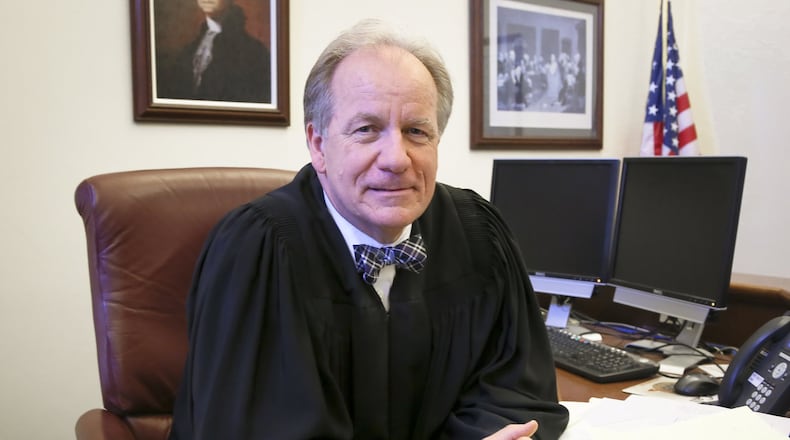“I guess he earned the right to be mom’s favorite,” the commissioner said. “I just want to say how proud I am of little brother.”
The probate court is part of the common pleas court system and handles adoptions, guardianships for people who can’t make decisions for themselves, hospitalization commitments for the mentally ill, wills and trusts and a myriad of other duties.
Rogers told the Journal-News he is most proud of his involvement in developing and presiding over the first specialty drug court in 1996 and the guardianship program. Specialty dockets focus on treatment of people’s problems rather than punishment and he said people were afraid of specialty dockets in the beginning.
“At the time you needed somebody with my type of personality, who would run into walls, get knocked down and get up and try again,” he said. “To do things like that you just simply had to not be afraid to fail.”
He was also involved in setting up the “outside the box” volunteer and eventually professional guardianship program at LifeSpan. He said there are many instances when a person with mental health issues or developmental disabilities has no family or other suitable person to handle their affairs, so probate courts would just appoint attorneys.
“The problem with that was attorneys are trained legally but they are not trained in areas that really require social workers,” Rogers said. “So probate courts really didn’t have an answer for all these difficult cases. There just wasn’t anybody that could step up and take charge.”
Rogers has provided a personal touch, visiting people in hospital or hospice before he must make an end-of-life decision for them, rather than just listening to others.
Becky DeLong, the court’s chief investigator in guardianship cases, said Rogers has insisted that his court be “the court that cares.”
“He wants the staff to listen to what people are saying because when you do things in our court, whether it’s a wrongful death or an estate, those are people who die so people who come in are emotional about it,” DeLong said. “Or somebody to come get a guardian, that’s a hard thing to do, so he always wants us to be the court that cares in that we take time with the people, we listen to the people and show value to whomever it is that comes in.”
Rogers said he promised his wife Nancy he would take two months off before embarking on another opportunity, either in private practice, as a visiting judge or he said several non-profits have expressed interest in filling his retirement time. He will also continue to push for renovating the iconic courthouse he has called his home away from home.
He had a few words of advise for Hamilton attorney John Holcomb, who takes over the court today.
“The job has changed me, it’s made me look at my own weaknesses and it’s made me more understanding of others,” Rogers said. “Governing other people is difficult, it’s a hard job. It’s hard to properly wield that kind of authority over other people’s lives. That’s what I learned. It’s something that has to be taken very seriously and I’m quite certain that John is going to do a great job.”
Holcomb said “it’s truly an honor to succeed him, he’s truly taken the court into the 21st century and I’m honored to continue his legacy of service to the community.”
Judge Randy Rogers
Age: 70
Elected: 1995
Education: Bachelor of Science from the University of Pennsylvania’s Wharton School of Business in 1973 and his Juris Doctor from University of Cincinnati’s College of Law in 1976.
Professional: Work at Holbrock & Jonson before opening his own private practice.
Personal: Married to Nancy Rogers, has three children and eight grandchildren.
About the Author

